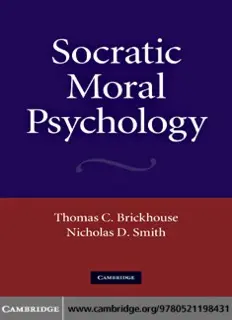
Socratic Moral Psychology PDF
Preview Socratic Moral Psychology
This page intentionally left blank Socratic Moral Psychology Socrates’ moral psychology is widely thought to be “intellectualist” in the sense that, for Socrates, every ethical failure to do what is best is exclu- sively the result of some cognitive failure to apprehend what is best. Until fairly recently, the view that, for Socrates, emotions and desires have no role to play in causing such failure went unchallenged. This book argues against the orthodox view of Socratic intellectualism and offers in its place a comprehensive alternative account that explains why Socrates believed that emotions, desires, and appetites can influence human motivation and lead to error. Thomas C. Brickhouse and Nicholas D. Smith defend the study of Socrates’ philosophy and offer a new interpretation of Socratic moral psychology. Their novel account of Socrates’ conception of virtue and how it is acquired shows that Socratic moral psychology is consider- ably more sophisticated than scholars have supposed. thomas c. brickhouse is John Mills Turner Professor of the Humanities, Department of Philosophy, Lynchburg College, Virginia. He is the co-author (with Nicholas D. Smith) of The Philosophy of Socrates (2000) and the co-editor (with Nicholas D. Smith) of The Trial and Execution of Socrates (2002). nicholas d. smith is James F. Miller Professor of Humanities, Department of Philosophy, Lewis and Clark College, Portland. He is the co-author (with Thomas C. Brickhouse) of Plato and the Trial of Socrates (2004) and the author of various essays on Plato, Aristotle, and contem- porary epistemology. SoCrATiC MorAL PSy CHoL ogy THoMAS C. BriCkHoUSe Lynchburg College and NiCHoLAS D. SMiTH Lewis and Clark College CAMBRIDGE UNIVERSITY PRESS Cambridge, New York, Melbourne, Madrid, Cape Town, Singapore, São Paulo, Delhi, Dubai, Tokyo Cambridge University Press The Edinburgh Building, Cambridge CB2 8RU, UK Published in the United States of America by Cambridge University Press, New York www.cambridge.org Information on this title: www.cambridge.org/9780521198431 © Thomas C. Brickhouse and Nicholas D. Smith 2010 This publication is in copyright. Subject to statutory exception and to the provision of relevant collective licensing agreements, no reproduction of any part may take place without the written permission of Cambridge University Press. First published in print format 2010 ISBN-13 978-0-521-19843-1 Hardback Cambridge University Press has no responsibility for the persistence or accuracy of urls for external or third-party internet websites referred to in this publication, and does not guarantee that any content on such websites is, or will remain, accurate or appropriate. Contents Acknowledgments page vi introduction 1 1 Apology of Socratic studies 11 2 Motivational intellectualism 43 3 The “prudential paradox” 63 4 Wrongdoing and damage to the soul 89 5 educating the appetites and passions 132 6 Virtue intellectualism 153 7 Socrates and his ancient intellectual heirs: Plato, Aristotle, and the Stoics 193 Appendix: is Plato’s Gorgias consistent with the other early or Socratic dialogues? 248 Bibliography 259 Index of passages 268 General index 272 v Acknowledgments Many of those who are the targets of our sharpest and most sustained criticism in this book, especially Mark McPherran and Terry Penner, are not only personal friends, but also scholars for whom we have the utmost respect and whose work we read with the greatest interest and enthusi- asm. Anyone who has actually engaged in the practices of philosophy or scholarship knows very well that the ones from whom we learn most are usually those with whom we can argue amiably and at length, and who express the clearest and most compelling versions of views with which we do not agree. The galvanizing effects of Daniel Devereux’s work on us is evident everywhere in this book. in recent years, a growing number of scholars have joined Devereux and us in rejecting the standard account of Socratic intellectualism, in favor of various views that recognize explana- tory roles for the appetites and passions. Among these, Jessica Moss and rachel Singpurwalla have now made several significant contributions, whose details we will occasionally contrast herein to our own non-standard account. We owe much to all of those whose views we criticize, for their scholarly contributions have not only provided instruction, but have also given us, the authors, reason to debate between ourselves and, in the end, to settle on our own positions. We also acknowledge with profound gratitude the assistance we have received from friends who were kind enough to read and criticize earl- ier drafts of parts or all of this book. Such benefactors include (in alpha- betical order): Hugh Benson, Thomas H. Chance, Antonio Chu, Angelo Corlett, Daniel Devereux, Zina giannopoulou, rusty Jones, rachana kamtekar, Mark McPherran, Jessica Moss, Terry Penner, Sarah raskoff, Naomi reshotko, george rudebusch, Daniel russell, rachel Singpurwalla, elliot Welch, and David Wolfsdorf. Finally, we are deeply indebted to the vi Acknowledgments vii anonymous readers of the book while it was still in manuscript form. Their many thoughtful and penetrating criticisms forced us to correct many errors and clarify numerous potential sources of misunderstanding. even when we were not persuaded by their searching criticisms, we were forced to rethink our views and deepen our understanding of what we think is correct.
